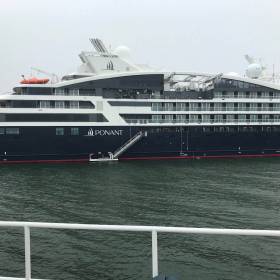Displaying items by tag: Port of Kinsale
Port of Kinsale’s Lobster Pot Christmas Creation Named ‘Unusual Tree of the Day’ by Alastair Campbell
Tony Blair’s former spin doctor has bestowed an unusual honour upon the Port of Kinsale’s special Christmas tree.
Earlier this week, Alastair Campbell named the lobster pot creation by local fisherman Eamonn O’Neill has his ‘Unusual Tree of the Day’ on social media.
According to the Southern Star, O’Neill first installed the tree — comprising 170 lobster pots stacked 15ft high next to the harbour master’s office — a year ago, with the help of the local maritime community, to support Kinsale RNLI.
At the time, O’Neill said he was inspired by similar structures he’d seen while fishing along the west of Scotland.
This time around, as the Kinsale Advertiser reports, the lobster pot tree was dedicated to raising funds for The Well Project, which unites three local charities related to mental health and wellbeing.
And there may still be time for those in the area to make a donation and guess the number of pots in the tree for some fantastic prizes.
Campbell currently co-hosts the podcast The Rest is Politics with former Conservative MP Rory Stewart.
West Cork: Kinsale Wants Slice of the Cruise Ship Trade
The Southern Star writes, that Kinsale in Co. Cork and other harbour towns want a slice of the €50m cruise ship trade.
County mayor, Christopher O’Sullivan said: ‘West Cork’s extensive coastline and the fantastic facilities in our harbours make it a very appealing destination for sophisticated cruise clients.’
Fantastic indeed! Because just when Kinsale is about to lick its chops in expectation of the high-spending tourists (the ‘sophisticated cruise clients’), downsizing of the liner trade in Ireland is set to become a reality.
The number of liners berthing in Dublin is to be reduced to 80 – a cutback of 50% . Pulling no punches, the Dublin Port authorities explained the reason. It was all about ‘commercial pragmatism’ and the need to find space for the freight and container traffic in the wake of Brexit.
Indeed, Tánaiste Simon Coveney already has warned of the knock-on effect on tourism for Cork, Waterford, Belfast and other ports of call when Dublin limits access to cruise liners. The liners won’t be there to go to Belfast or Cork. As simple as that!
Not that our esteemed Transport Minister, Shane Ross, is worried. Much like Alfred E Neuman of Mad magazine, he described the crisis as ‘a temporary blip.’ The All-Ireland Cruise Ship Action Group, had a much more dramatic message: ‘Dublin’s catastrophic decision could devastate Irish tourism.’
To read more from the regional newspaper click here.






























































